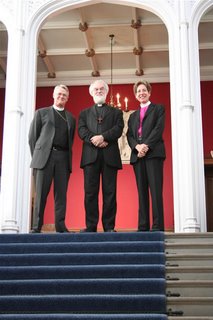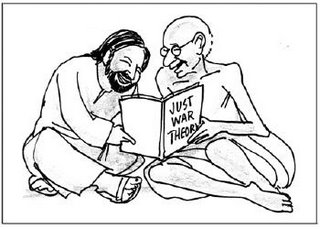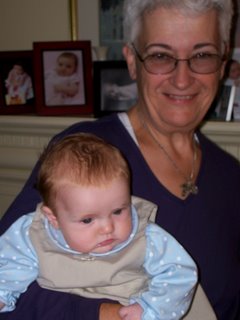
A Baptismal Love Letter to Reese Michele Cicola
Pentecost XXI – October 29, 2006 – The Episcopal Church of St. Paul, Chatham, NJ
The Rev’d Elizabeth Kaeton, rector and pastor
Dear Reese,
One of the deep joys of being a parish priest is being invited into the families of the congregation. It seems hard to believe that your brother, Nicky, was baptized here just a few short years ago. And now, here you are, as beautiful as your brother is handsome. And, your parents, grandparents, godparents and relatives are just as thrilled to be here on this very important day.
It’s hard to imagine that in about 10 or 12 years, you’ll be reading this Love Letter and preparing yourself for Confirmation. I hope you’ll be reading the scriptures appointed for today (Jeremiah 31;7-9; Psalm 126, Hebrews 7:23-28; and Mark 10:46-52) and considering what message they have for you as you take these baptismal vows for yourself.
I want to focus on the story of Blind Bartimaeus from Mark’s gospel, because I think this story has a great deal to say about faith and healing – and those two thing, Reese: faith and healing – are central to what I know being a Christian is all about.
The first thing to note about Bartimaeus is that his blindness has apparently not been from birth. He asks Jesus, “My teacher, let me see again.” Did you hear that? “Again.” Bartimaeus was once able to see but now is blind. One wonders what caused him to be blind. Was it an infection that caused his blindness? Did he sustain an injury that detached his retina? Did he need glasses? Perhaps he was born with cataracts which today would have been corrected with a simple outpatient procedure with lasers.
I can only imagine how cataracts might be treated 10 or 12 years from now. But, centuries ago, it caused blindness. Hard to imagine, isn’t it? But you know, it still causes blindness in some parts of the world. Some children growing up in the Global South can not dream of the things we take for granted. As I write this letter to you there is genocide happening in Darfur in Africa, while not six hundred miles away, other Africans have greater affluence than some Americans or Western Europeans. It just doesn’t make any sense, does it?
As I write this, war is also raging in Iraq and thousands of American soldiers – mothers and fathers of young boys and girls, as well as innocent Iraqi mothers and fathers and their children – are dying in a war that no longer makes any sense (if it ever did). Within just these two examples lie the first lesson from this morning’s gospel, Reese: not all blindness is physical. Many of us are spiritually blind to the hunger and poverty and disease and senseless deaths of people around the world. We turn a blind eye to them and then wonder why our own faith goes lacking.
The second thing to notice in this story of Blind Bartimaeus is his persistence. Scripture tells us that “Many sternly ordered him to be quiet, but he cried out even more loudly . . .” Persistence is a wonderful form of faith, Reese. The funny thing about persistence is that we don’t recognize it as faith. Many people will “pooh-pooh” it as stubbornness or willfulness – as if those were bad things. I suppose, in some situations, they can be.
But, when we are moved to do something – when we know in our gut that this is the right thing to do – when everyone else in our family or our culture tell us that we are wrong, and even we don’t understand why it is or how it is we get the strength to stand up and ask for what we need – well, that persistence is faith in action. Some might call it “blind faith” – which is a good form of blindness, if you can imagine that. Persistence is faith that is blind to obstacles that stand in our way. Persistence is faith that stays focused on achieving the thing we know we are called by God to do – to achieve. And we know that if we but persist, if we persevere, God will give us what it is we need, and justice will have been served.
Just this week, the Supreme Court of New Jersey handed down a decision that will provide LGBT people their civil right to marriage. Right now, we’re not calling it ‘marriage’. It’s called a civil union. Whether or not we call it marriage is up to the activist and the lawmakers to decide. The important thing is that 30 years ago it was not possible to even imagine such a thing. Persistence – blind faith – has brought us to this moment in time, just as it brought Bartimaeus to spring up from his feet and find his way to Jesus.
The last thing to note about this story, Reese, is something about healing. Jesus did not touch Bartimaeus in order to heal him. He simply said, “Go; your faith has made you well.” Not, “I have made you well.” Jesus said, “Your faith as made you well.” I want you to pay close attention to that, Reese.
It is faith that heals. Blind faith. Persistent faith. Faith that is strong enough to pull us up out of our spiritual blindness and lead us toward that which is good and true. Faith that has the courage to throw off that which has kept us comfortable and warm and risk our safety for hope – for the promise of hope – for ‘hoping against hope’ – for hope which is unseen and unknown but we can still feel it burning deep within our bones. It is the flicker of that hope which lights the way, and our eyes are suddenly opened to possibility and opportunity – against all the odds or prevailing wisdom.
Before Bartimaeus could see Jesus with they eyes in his head, he saw him through the eyes of his heart. That kind of faith is the stuff of miracles, Reese. And, contrary to what you may believe in this thoroughly modern age, miracles happen all the time. You, in fact, are a miracle. You and your brother. You are the dream of your mothers. You are the embodied hope of your grandparents and godparents and aunts and uncles and cousins. That baptismal dress you are wearing is a family heirloom. Fifty years ago, no one could have possibly imagined that you would be wearing it today. That you would be here, all pink and beautiful and precious. But you here you are. A living, breathing, cooing miracle.
Here’s what I know about being a Christian, Reese: faith and healing are central to the Christian identity because at the core of being Christian is the most powerful force on earth. That force is called love. In the church we call it Love Incarnate, Love Divine. It is the love which called you into being. It is the love which called you forth from the heavens and brought you here to be with us. It is the love which can only be seen through the eyes of the heart.
This is the love and the faith and the healing into which you are about to be baptized, Reese. It is the legacy and the heritage of baptism. You remind us all of those gifts today, the gifts each of us were given at our baptism. As we renew our baptismal vows with you, some of us will have the eyes of our hearts opened. Some of us who have been spiritually blind for a while will find that our sight has been renewed.
Little miracles will happen all over the church. Case in point: that baptismal font. It has been sitting over there, in the corner, for as long as anyone can remember, but it has not been used. Why? Well, when baptisms were performed there, not everyone in the congregation could see. We’d have to move it to the center aisle, but it’s very, very heavy. So, instead of using it, we’ve been using a glass bowl on a movable stand. Meanwhile, that baptismal font sits over there – like some kind of antique or family heirloom.
A conversation with the Altar Guild led to its being moved today. Your baptism is the first part of the Great Baptismal Font Experiment. We’re going to try it out here, for a while, to open the eyes of our hearts to the possibilities it may bring to us. To see things in a new way that we might not have seen before. We’re being blindly led by faith to see what might be healed in us, what harness of heart may be softened – as individuals and as a community – when we put baptism back into the center of our lives.
It’s an exciting time in this community of faith, Reese, and you are part of it. There’s no telling what may happen next. Oh, some people will grumble – but, some people always do. There will always be those among us, like there were for Bartamaeus, who will sternly order us to be quiet – to not disturb the status quo – to not cause the problems which inevitably come when some things change.
Remember this, Reese: Persistent faith, blind faith, is at the heart of healing. And healing is at the heart of what it means to be Christian. Welcome to your life in Christ, Reese. Welcome to the little miracles that abound when we open the eyes of our heart to the presence of Love Incarnate, Love Divine. Amen.










